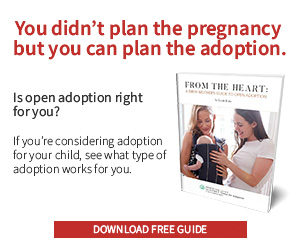ADOPTION IN
Florida

The Florida adoption options are available for those considering placing a child for adoption or adopting a child into their growing family. There are many reasons parents in all stages of life may consider placing or adopting a child. Your needs matter when it comes to the Florida adoption process. A Florida adoption agency can help you create an adoption plan that works best for you. Adoption in Florida can be an option for you.
Adoption Near Me

Considering Placing Your Baby or Child for Adoption? You can learn more here or call an adoption counselor 1-800-236-7898.
Domestic Infant Adoptions can be completed through a Florida adoption agency or adoption attorney. Click here for a directory of adoption service providers in Florida.
International Adoptions must be completed through an adoption agency or adoption attorney. Find an international adoption service provider here.
Foster Care Adoptions in Florida can be completed through the Florida Department of Children and Families (800-962-3678).
Looking for more resources in your area? Check out the Adoption Directory for a listing of adoption professionals in your state.
Gallery of children waiting to be adopted.
Join the Florida adoption group in our community!
I’m considering placing my baby or child for adoption.
Pregnant and have questions? We can help answer your questions by telling us what works best for you.
Are you pregnant and considering adoption? Do you need help getting started?
Click here and help us understand what your needs are and the preferences you have. We can help you get started.
Adoption in Florida
By: A. Murray
Florida is often referred to as the Sunshine State. Expectant parents considering adoption from Florida should learn about the requirements for adopting in this state so they are not in the dark and can make informed choices about their options. Let’s let the sunshine in on Florida adoption law and the framework it provides for adoption from Florida.
The Florida Statutes and Adoption Law
Adoption is a legal process, and each state has its own set of laws governing adoption. In Florida, adoption laws are found in Chapter 63 of the Florida Statutes. An expectant parent doesn’t need to visit a law library or even an attorney to access these laws; the Florida Statutes are available on the Internet by Googling “online sunshine.” Chapter 63 can be found here, allowing citizens to read the adoption law for themselves and see what the framework is for adoption from Florida.
Expectant parents, of course, are the ones who must determine what option is best for their child. Making an informed decision includes getting information about what these options are, a subject addressed in an article on that topic called “Adoption Options.” These options include parenting, terminating the pregnancy, or placing the child for adoption. No deadline exists for choosing the adoption option. In Florida, the process may begin before a baby’s birth or at any point afterward. Perhaps a woman wants to see if it is possible to parent a child; if she attempts to parent and, as a result, realizes that option will not work, it is not too late to pursue an adoptive placement.
Even though the adoption process in Florida may begin while a woman is pregnant, an adoption plan cannot be finalized until after the child’s birth. The only action which will obligate a birth mother to place her child for adoption is her signing consent to the adoption. Her consent cannot be signed until after her baby is born. When the goal is for a baby to go home from the hospital with an adoptive couple, an adoption plan is typically made during pregnancy.
Finding a Florida Adoption Entity
A birth mother can choose who she wants to work with to assist her with adoption from Florida. Florida law allows both licensed child-placing agencies and attorneys to serve as what the adoption law refers to as an adoption entity. An agency is an organization that handles adoption placements while an attorney is an individual. Adoptions handled by attorneys are called private adoptions. Whether working with an agency or an attorney, Chapter 63 of the Florida Statutes controls how an adoption must be handled, and both agencies and attorneys have to abide by those statutory provisions.
The Gladney Center for Adoption is one adoption agency that serves expectant mothers before, during, and after the placement process is completed. Choosing to place a child for adoption is a big step, but Gladney counselors and case workers are prepared to help you make the right decision for you. Counseling, family profiles, and aid throughout the pregnancy is available to expectant mothers considering adoption.
The search for an appropriate adoption entity to assist a birth parent with adoption from Florida can easily be conducted online. A helpful resource is the website of the Florida Adoption Council (FAC), a statewide organization of adoption professionals. FAC’s site provides information on adoption entities by category (agency or attorney) and by geographical location in the state. Choosing a licensed agency or attorney with experience in the adoption area is an important consideration for an ethical and successful outcome.
A birth mother of any age may pursue an adoption from Florida. She does not have to be age 18, often referred to as “of legal age,” to decide to place a child for adoption. Women who are 14 or over may sign a consent for adoption independently. If a woman is age 14 or under, she may still make an adoption plan; however, her signing consent to the adoption has to be witnessed by a parent, legal guardian, or a court-appointed guardian for that purpose, called a “guardian ad litem”.
When a Florida adoption entity begins working with an expectant parent, that entity is legally required to give the parent an Adoption Disclosure form. Receipt of the disclosure form must be acknowledged in writing. This Adoption Disclosure contains information about the adoption process which the Florida Legislature determined was important for an expectant parent to know at the outset of an adoption journey.
One of the things an Adoption Disclosure informs an expectant parent of is that he or she has the right to consult an attorney of his or her own choosing to obtain adoption advice. The adoption entity does not provide legal representation or advice to the birth parents. In fact, the adoption entity usually represents the prospective adoptive parents and not the birth parents. If the birth mother desires her own separate legal representation, the adoptive parents are permitted to cover that expense.
Expenses Prospective Adoptive Parents Can Cover
Although buying and selling a baby is illegal in Florida, the Florida adoption laws do recognize there are some instances in which the payment of certain living and medical expenses by the prospective adoptive parents is permitted. The payment of any such authorized expenses does not obligate the birth mother to sign a post-birth consent for the adoption.
Expenses which Chapter 63 of the Florida Statutes allow prospective adoptive parents to pay must be for “reasonable” and “necessary” items connected to the pregnancy for which the birth mother cannot otherwise pay. Speeding tickets are examples of expenses that would not be deemed reasonable, necessary, and connected to the pregnancy. For living expenses, the items must belong within specific categories of allowable expenses—rent, utilities, food, transportation, and clothing. Any payments made to or on the birth mother’s behalf, such as a rent payment sent directly to the landlord, must be documented on an accounting filed with the court.
Under Florida law, assistance with living expenses can only be provided during the pregnancy and the six weeks postpartum period. A $5,000 cap exists for the payment of such expenses. This cap does not mean a birth mother is automatically entitled to $5,000 in living expense assistance; it is simply a limit on the cumulative amount which can be provided. Each one of the expenses covered to reach that cap must be reasonable, necessary, connected to the pregnancy, something the birth mother cannot pay, and in an allowable category of expenses. Amounts over $5,000 or expenses not specifically enumerated may be paid if a court determines in advance (meaning before payment) that the expense is an extraordinary one which is justified.
If an expectant mother has coverage for medical expenses either through Medicaid or private insurance, she should look to that coverage for payment of medical expenses first. Her eligibility for pregnancy Medicaid coverage is not affected by the fact that she plans to place her child for adoption. If private insurance coverage is in place, the prospective adoptive parents are authorized to cover out-of-pocket medical expenses such as co-pays and deductibles that the birth mother cannot pay. Having appropriate documentation available for the adoption entity, such as a Medicaid number or a copy of the private insurance policy, will facilitate addressing payment of medical expenses.
Proof of Pregnancy
Although not required by Florida law, as a matter of best practice, adoption entities generally require proof of pregnancy from an expectant mother before any type of financial assistance and matching with prospective adoptive parents occurs. Public health departments and crisis pregnancy centers can provide such proof for pregnant women. If prenatal care has begun, the adoption entity will usually ask the birth mother to sign a medical release so that the obstetrician’s office can be contacted directly to confirm the pregnancy.
Paternal Rights and Their Revocation
While an expectant mother cannot obligate herself to make an adoptive placement pre-birth, Florida law does provide two methods by which an expectant father can definitively and irrevocably be addressed before the child’s birth. If he signs a pre-birth Affidavit of Nonpaternity, his agreement for his rights to be terminated so the child may be adopted is locked in at that point. The “nonpaternity” language of the document’s name means that the birth father is not planning to parent the child. That decision may be based on his belief that he is not the baby’s biological father or it may be based on his decision that he does not want to or cannot parent another biological child.
Court action may also take a birth father out of the picture before the child’s birth under Florida law. If a birth father refuses to sign an Affidavit of Nonpaternity, the court may issue a Notice Of Intended Adoption Plan to be served to him. This notice informs the man of the birth mother’s pregnancy, her plan to place her child for adoption, and the steps he must take within thirty days following service if he wishes to object to the adoption. His failure to take all those steps within that timeframe results in a loss of his ability to influence the child’s adoptive placement.
An unmarried expectant father who does intend to be a parent or involved in his child’s life should immediately register that intention with Florida’s Putative Father Registry. Information on how to file a claim of paternity with the Putative Father Registry can be found online. Pamphlets providing information about the registry are also available at the Department of Motor Vehicles, clerks of courts’ offices, and public health departments.
Choosing a Prospective Adoptive Family
The choice of prospective adoptive parents is a critical one because these are the people who will be raising the child placed for adoption. Depending on the adoption entity, the entity can provide possible choices for review by a birth parent or move forward with a placement with prospective adoptive parents whom the birth mother has located through her own efforts. Regardless of how the prospective parents are located and selected, they must have a favorable preliminary home study completed to legally have a child placed with them for adoption from Florida.
The required home study is an extensive and comprehensive background investigation that includes an inspection of the physical home where the child will be residing as well as numerous checks related to the adopting parents themselves. Part of that investigation will be to determine if the intended parents are financially capable of raising a child and if they have any negative background history; for example, an arrest or report of child abuse would call into question their suitability to parent.
Counseling Requirements and Offers
Even if a birth mother knows in her head that an adoptive placement is best for her baby, that does not mean following through on her chosen option will be easy. Coping with emotions and some type of grieving will be involved. Florida law requires adoption entities to advise birth mothers that they have the right to receive counseling to help them through this life-changing process. Counseling is provided at no cost to birth mothers and may continue during the postpartum period.
A birth mother may, of course, refuse the offer of counseling. Nevertheless, one meeting with a licensed individual is required by Florida law before a birth mother signing a consent. If she signs a written consent, it is likely she will not have to go to court for the adoption to proceed; the judge will take the required legal actions based on her written consent. But since the judge will never lay eyes on the birth mother, he needs some assurance that her consent was made knowingly, willingly, and voluntarily. A private interview with a counselor or social worker will provide the basis of a report to the court that the consent is being given in that manner.
Waiting Period before Signing Consent
When a newborn is being placed for adoption, Florida law imposes a waiting period before a birth mother may legally sign a consent to the adoption of her child. Once her consent is signed, she cannot change her mind; her decision will stand unless she can prove by a higher-than-usual evidentiary standard that her consent was obtained via fraud or duress. The reason behind the waiting period is to make sure that the birth mother has mentally recovered enough from childbirth to understand what she is doing when she signs something she cannot take back. The required waiting period under Florida adoption law is the earlier of 48 hours from the time of the child’s birth or the entry of a written discharge order on the birth mother’s hospital chart.
Florida law does not impose a waiting period for a birth mother to sign a consent form if the child she is placing for adoption is over the age of 6 months. Nevertheless, for a child that age, the birth mother has three business days in which she may change her mind. A written notification that she is revoking her consent must be provided to the adoption entity. The required procedure for revocation is set out in the consent to adoption, a copy of which must always be given to the signing birth parent regardless of the age of the child being placed for adoption. Once a consent form is signed, the child may be legally placed with the prospective adoptive parents who are quickly designated as the legal guardians of the child pending finalization of the adoption, a process that will take a minimum of 90 days.
Regardless of when a birth mother signs a consent, Florida law has specific requirements for how consent is being taken. Two witnesses and a notary must be present to observe the consent’s execution. The birth mother has the right to choose one of the two witnesses if she desires. After the consent is signed, she must be provided with a duplicate of the document for her records. When she puts the pen down from signing her consent, her decision is irrevocable meaning it is the point of no return from that decision.
Naming the Adoptee
A birth mother may name a child she is placing for adoption. Shortly after birth, she will be asked to complete and sign an application for a birth certificate. Florida law requires that such an application be submitted within a couple of days following birth. The birth mother may decline to give the child a name, resulting in a birth certificate where the child’s last name is that of his or her birth mother. Even if a name is chosen and an original birth certificate issued in the name given by the birth mother, the child’s name will be changed through the adoption.
The Termination of Parental Rights Case
Since adoption is a legal process, court proceedings are required for adoption from Florida to be finalized. These court proceedings are a two-step process. The first step is a termination of parental rights case. In such a case, the court is asked to terminate the legal connection between the child and any parent, birth or legal, who is connected to the child initially. Specific legal grounds for termination, such as the execution of a consent or pre-birth Affidavit Of Nonpaternity or the failure to respond to a Notice of Intended Adoption Plan or a petition for termination of parental rights pending adoption, must be identified and proven to the court. A birth parent who has signed a document consenting to adoption typically does not need to appear in court. The court’s entry of a judgment terminating parental rights severs any legal rights or responsibilities a birth or legal parent has for the child. Of course, the child will still always be biologically related to his birth parents.
The Adoption Case
An adoption case follows the termination of parental rights case in Florida courts, and the birth parents are not parties to this proceeding. In this second case, the prospective adoptive parents ask the court to name them the legal parents of the child and to give the child the name which they have chosen for him. A final hearing will be scheduled to finalize the adoption after a minimum of 90 days has elapsed since the placement of the child, and the adoptive parents have completed the required post-placement supervision process required by Florida law.
After finalization, Florida’s Office of Vital Statistics can issue a new birth certificate for the child who has been adopted based on the court’s direction in the final judgment of adoption. This new birth certificate will list the adoptive parents as mother and father, and it will bear the name which they have given to the child.
Post-Placement Communication
Following the finalization of adoption from Florida, birth parents no longer have any legal connection to or responsibility for their child. Nevertheless, a biological connection remains, and birth parents may want to have periodic updates about or contact with their child. Post-placement contact should be addressed before the child’s placement so the adoptive parents and the birth parents are on the same page as to what is expected in the future. Even if reduced to writing, the post-placement contracts in Florida are not enforceable in court; they are simply a good faith agreement between the parties. Adoptive parents may decline to honor those terms if they feel it is in the child’s best interest.
Reunion
Florida law recognizes adoptees may want to locate and have direct contact with a birth parent when they are adults. Therefore, the Florida Adoption Reunion Registry, also known as FARR, exists to facilitate that contact. Birth parents must be given a FARR brochure before signing a consent so they are aware that such contact may occur. The FARR brochure contains an application to register for free if the birth parent desires a future connection. Once the adoptee is over age 18, he or she may contact the registry’s toll-free number to see if a birth parent has registered and then obtain the contact information the biological parent provided.
Learn More
Gathering information on Florida adoption is a good first step for an expectant parent to be equipped to make an informed decision about the best option to pursue. Several online resources exist for obtaining information on Florida adoption law, as well as adoption entities being available to assist with the adoption option. Don’t be in the dark about adoption from Florida; let the sunshine in on the pertinent information about that option before deciding which course is right for you.
Florida Adoption Guide
The information contained on this website is for educational purposes only and is not intended to be a substitute for professional legal advice. Always seek the advice of a licensed and qualified professional. While the content of this website is frequently updated, information changes rapidly and therefore, some information may be out of date, and/or contain inaccuracies, omissions or typographical errors.
<– End –>
Can I Adopt in Florida?
Applicants must be at least 20 years old in order to adopt. Parents can be single, married, or divorced. You can own or rent a home, as long as the home passes a state safety inspection. Hopeful adoptive parents need to be financially stable enough to support a child’s basic needs. Parents will need to pass a background check before being cleared to adopt a child. For more information, visit AdoptFlorida.org.
What Adoption Regulations Exist in Florida?
Advertising: Only an adoption entity may advertise that a minor is available for adoption or that a minor is sought for adoption.
It is unlawful for any person, except an adoption entity, to charge or accept any fee or compensation of any nature from anyone for making a referral in connection with an adoption. It is unlawful for any person to sell or surrender a minor to another person for money or anything of value.
Relinquishment: An affidavit of nonpaternity may be signed before birth; however, consent to the adoption cannot be executed before birth unless in a preplanned adoption. A birth mother cannot consent to an adoption until 48 hours after the birth of the child, or the day after being released from the hospital, whichever occurs earlier. Birth father’s can consent to the adoption anytime after birth.
Consent given within 48 hours of the child’s birth is valid upon execution unless obtained by fraud or duress. The court may order scientific testing and reserve a ruling on the removal of the child if an unmarried father wishes to withdraw consent, but has not been established to be the father through marriage, court order, or genetic testing.
If the minor to be adopted is at least 6 months old, a 3 day revocation period exists for the birth parents. Once the child is placed with prospective adoptive parents, consent can only be revoked if the court finds that consent came under fraud or duress.
An affidavit of nonpaternity may only be withdrawn if the court finds it came under fraud or duress.
Birth parent expenses: Reasonable living expenses (rent, utilities, basic telephone charges, food, clothing, transportation, insurance) and medical expenses are allowed to be paid by the hopeful adoptive parents to the birth parents.
Post-adoption contact agreements: Contact agreements in Florida are not legally enforceable.
Birth father rights: The Department of Health has created a Putative Father Registry through its Office of Vital Statistics in Florida. In order to retain the right to receive notice of adoption proceedings, unmarried fathers must register their information with the Florida Putative Registry.
Finalization: Children usually live with hopeful adoptive parents for at least 6 months before finalization. The average amount of time between TPR and adoption finalization in 2014 was 10.8 months (acf.hhs.gov).
Is Adoption Assistance Available in Florida?
Can I adopt a Child from another country?
It is always possible to adopt a child from another country, even if you live in the U.S. Children under 18 adopted from a Hague Convention country entering the U.S. with an IH-3 visa automatically receive U.S. citizenship.
Children adopted from a non-convention country must qualify as orphans before receiving U.S. citizenship. When U.S. citizens finalize an adoption abroad, they must apply to the USCIS for an IR-3 visa for the child. An IR-3 visa classifies the child as an immigrant and provides the child with citizenship upon arrival in the U.S.
The immigration process varies for intercountry adoptions that are finalized after the child arrives in the U.S. Florida currently gives full effect and recognition to adoption decrees from other countries issued in full compliance with the laws of that country and the United States. For more information on how to adopt a child internationally, be sure to contact your local international adoption agency.
State Contacts
Gallery of children waiting to be adopted: https://adoption.com/photolisting?page=1&search_type=state&range=11
State subsidy contact person:
Bob Rooks
Florida’s Adoption Information Center
4203 Southpoint Blvd.
Jacksonville, FL 32216
Phone: 800-96-ADOPT • 800-962-3678 (in Florida); 904-353-0679 (outside Florida)
Fax: 904-353-3472
Email: brooks@danielkids.org
Summary
Adoptions in Florida can be completed through the Florida Department of Children and Families.
Applicants must be at least 20 years old. Parents can be single, married, or divorced. You can own or rent a home. Hopeful adoptive parents need to be financially stable. Parents need to pass a background check and home study.
Only an adoption entity may advertise that a minor is available for adoption or that a minor is sought for adoption.
A birth mother cannot consent to an adoption until 48 hours birth of the child, or the day after being released from the hospital, whichever occurs earlier. Birth father’s can consent anytime after birth. Consent given within 48 hours of the child’s birth is valid upon execution unless obtained by fraud or duress. If the minor to be adopted is at least 6 months old, a 3 day revocation period exists for the birth parents.










